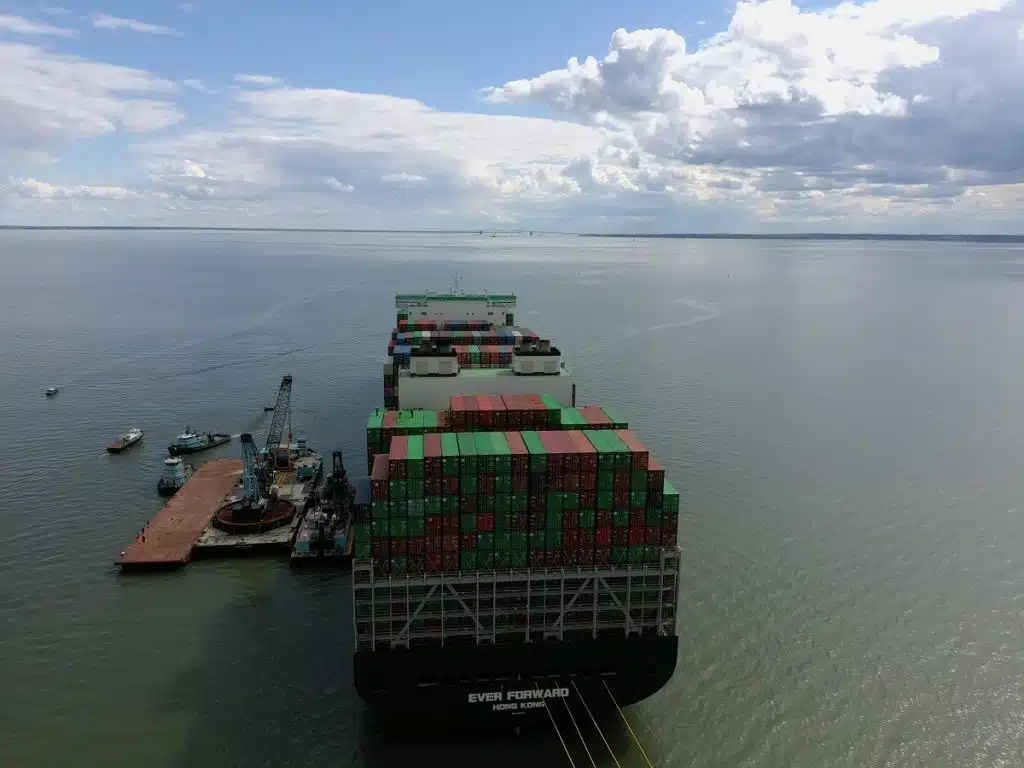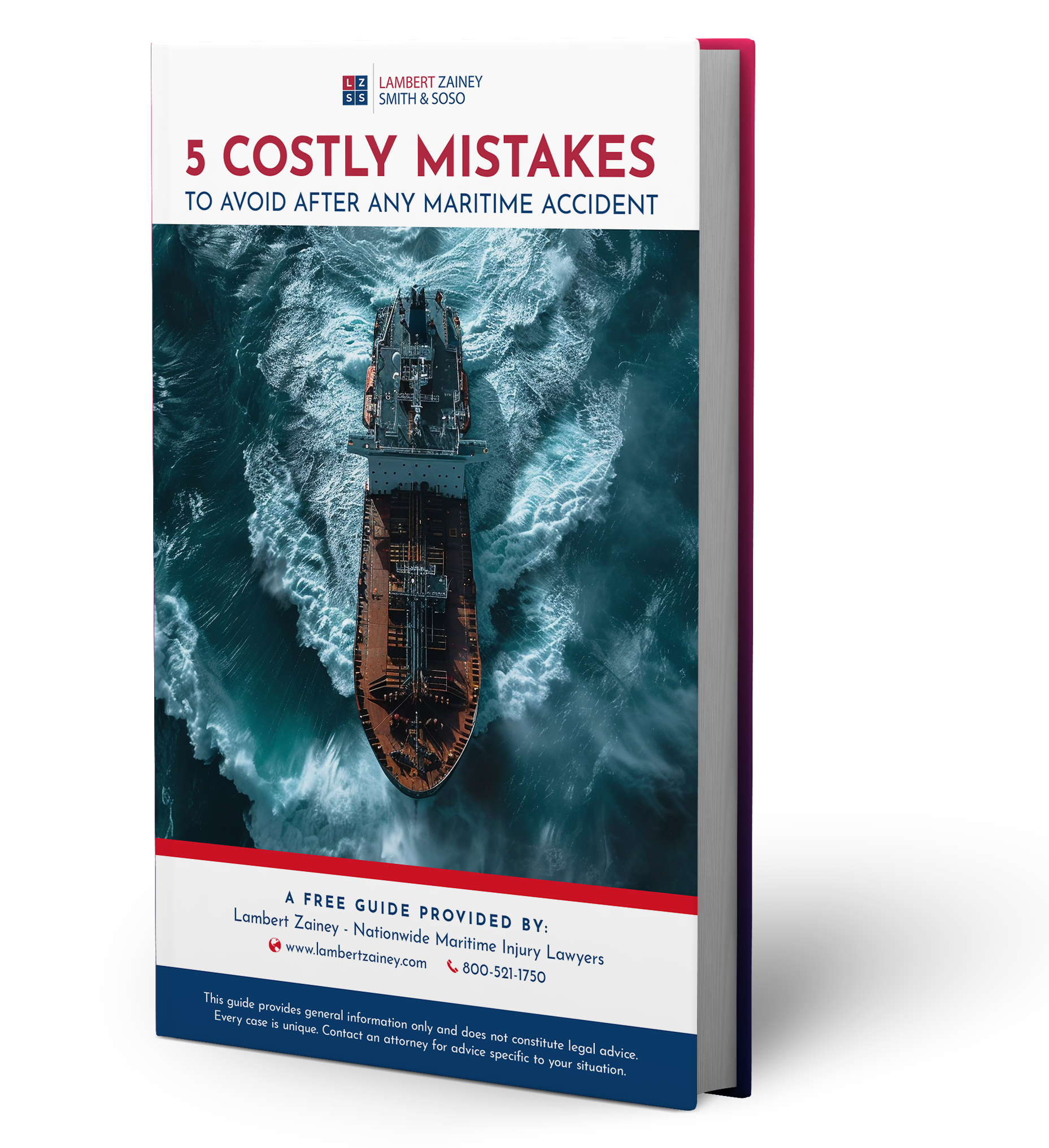A distraction is anything that takes our attention away from the task at hand. For those who work under hazardous conditions, such as maritime and offshore workers, distractions can be deadly. It only takes a moment of inattention for a serious maritime accident to occur.

Unfortunately, there are many things that can distract maritime and offshore workers from what’s going on around them. Cell phones and texting are two examples. Talking on a cell phone or texting while operating or navigating a vessel can be just as dangerous as talking or texting while driving an automobile. Cell phone use related maritime accidents can be just as dangerous and devastating as those that take place on the road.
Benefits of Cell Phones for Maritime and Offshore Workers
Cell phones have impacted everyone’s lives, including those who work in the maritime industry. They offer many benefits, especially for maritime and offshore workers who can spend weeks and months away from home. Cell phones provide workers with the means to stay in touch with loved ones even while at sea, helping to reduce depression, loneliness, and other mental stress. They also give workers access to music, movies, TV shows, and social media, providing welcome relief from the monotony of living aboard a vessel at sea or an offshore drilling rig.
In addition, cell phones can serve as a backup if a vessel’s communications system is down, helping to maintain safe operations. Apps can be downloaded onto cell phones, giving workers access to valuable real-time information about weather conditions, high and low tides, maps, water depth, and more.
Dangers of Cell Phones on Ships
Onboard a vessel, cell phone use becomes a hazard when it distracts the crew from their duties. Distracted crewmembers can place a vessel and its crew at risk, particularly when a vessel is:
Cell phone distractions have been responsible for a number of maritime accidents in the U.S. and elsewhere:
It’s not just not maritime and offshore workers who are at risk of cell phone maritime accidents. According to Coast Guard’s 2021 Recreational Boating Statistics Report, operator inattention (such as cell phone use) was one of the leading causes of recreational boating accidents in the U.S.
Maritime Workers’ Rights After an Accident Caused By Cell Phone Use
All maritime employers are required by law to maintain a safe working environment for their employees. This includes rules and training for appropriate cell phone use aboard a vessel or offshore drilling platform. When they fail to do so, all kinds of accidents can happen, including fires, explosions, machine mishaps, electrocution, exposure to hazardous materials, slips, trips, falling overboard, and drowning to name just a few.
Maritime accidents can result in a number of serious, even fatal injuries, such as:
When a maritime or offshore worker becomes injured as a result of the negligent actions of a coworker or employer, the Jones Act and other maritime laws give them the right to seek compensation for the damages caused by their injuries. Current and anticipated medical expenses, lost wages, loss of employment, pain, and suffering are some of the damages a maritime worker can experience after being injured in an on-the-job accident.
Get Our FREE Guide to Protect Your Claim
What you do after an accident is critical. Insurance companies will try to get you to make mistakes that can hurt your claim. Our free guide can help you avoid these traps.
Download our complimentary guide: “5 Costly Mistakes to Avoid After Any Maritime Accident” to arm yourself with the knowledge you need to protect your rights.
Speak to a New Orleans Maritime Accident Injury Attorney About Your Case
If you are a maritime or offshore worker who was injured in an on-the-job accident that was caused by negligent cell phone use, the best way to make sure your rights are protected is to speak to an attorney who understands maritime laws. They can help you file a claim, investigate your accident, determine the extent of your damages, negotiate a settlement, and represent you in court..
The New Orleans-based maritime law firm of Lambert Zainey has been protecting the rights of injured maritime workers and their families for over 40 years. We have recovered over a billion dollars in settlements for our clients, including workers and the families of workers injured and killed in the waters of the Gulf Coast and across the United States.
You can contact the offices of Lambert Zainey through our website or call us at (504) 581-1750 to schedule a free initial consultation with an experienced maritime and offshore accident attorney.
A distraction is anything that takes our attention away from the task at hand. For those who work under hazardous conditions, such as maritime and offshore workers, distractions can be deadly. It only takes a moment of inattention for a serious maritime accident to occur.

Unfortunately, there are many things that can distract maritime and offshore workers from what’s going on around them. Cell phones and texting are two examples. Talking on a cell phone or texting while operating or navigating a vessel can be just as dangerous as talking or texting while driving an automobile. Cell phone use related maritime accidents can be just as dangerous and devastating as those that take place on the road.
Benefits of Cell Phones for Maritime and Offshore Workers
Cell phones have impacted everyone’s lives, including those who work in the maritime industry. They offer many benefits, especially for maritime and offshore workers who can spend weeks and months away from home. Cell phones provide workers with the means to stay in touch with loved ones even while at sea, helping to reduce depression, loneliness, and other mental stress. They also give workers access to music, movies, TV shows, and social media, providing welcome relief from the monotony of living aboard a vessel at sea or an offshore drilling rig.
In addition, cell phones can serve as a backup if a vessel’s communications system is down, helping to maintain safe operations. Apps can be downloaded onto cell phones, giving workers access to valuable real-time information about weather conditions, high and low tides, maps, water depth, and more.
Dangers of Cell Phones on Ships
Onboard a vessel, cell phone use becomes a hazard when it distracts the crew from their duties. Distracted crewmembers can place a vessel and its crew at risk, particularly when a vessel is:
Cell phone distractions have been responsible for a number of maritime accidents in the U.S. and elsewhere:
It’s not just not maritime and offshore workers who are at risk of cell phone maritime accidents. According to Coast Guard’s 2021 Recreational Boating Statistics Report, operator inattention (such as cell phone use) was one of the leading causes of recreational boating accidents in the U.S.
Maritime Workers’ Rights After an Accident Caused By Cell Phone Use
All maritime employers are required by law to maintain a safe working environment for their employees. This includes rules and training for appropriate cell phone use aboard a vessel or offshore drilling platform. When they fail to do so, all kinds of accidents can happen, including fires, explosions, machine mishaps, electrocution, exposure to hazardous materials, slips, trips, falling overboard, and drowning to name just a few.
Maritime accidents can result in a number of serious, even fatal injuries, such as:
When a maritime or offshore worker becomes injured as a result of the negligent actions of a coworker or employer, the Jones Act and other maritime laws give them the right to seek compensation for the damages caused by their injuries. Current and anticipated medical expenses, lost wages, loss of employment, pain, and suffering are some of the damages a maritime worker can experience after being injured in an on-the-job accident.
Get Our FREE Guide to Protect Your Claim
What you do after an accident is critical. Insurance companies will try to get you to make mistakes that can hurt your claim. Our free guide can help you avoid these traps.
Download our complimentary guide: “5 Costly Mistakes to Avoid After Any Maritime Accident” to arm yourself with the knowledge you need to protect your rights.
Speak to a New Orleans Maritime Accident Injury Attorney About Your Case
If you are a maritime or offshore worker who was injured in an on-the-job accident that was caused by negligent cell phone use, the best way to make sure your rights are protected is to speak to an attorney who understands maritime laws. They can help you file a claim, investigate your accident, determine the extent of your damages, negotiate a settlement, and represent you in court..
The New Orleans-based maritime law firm of Lambert Zainey has been protecting the rights of injured maritime workers and their families for over 40 years. We have recovered over a billion dollars in settlements for our clients, including workers and the families of workers injured and killed in the waters of the Gulf Coast and across the United States.
You can contact the offices of Lambert Zainey through our website or call us at (504) 581-1750 to schedule a free initial consultation with an experienced maritime and offshore accident attorney.









